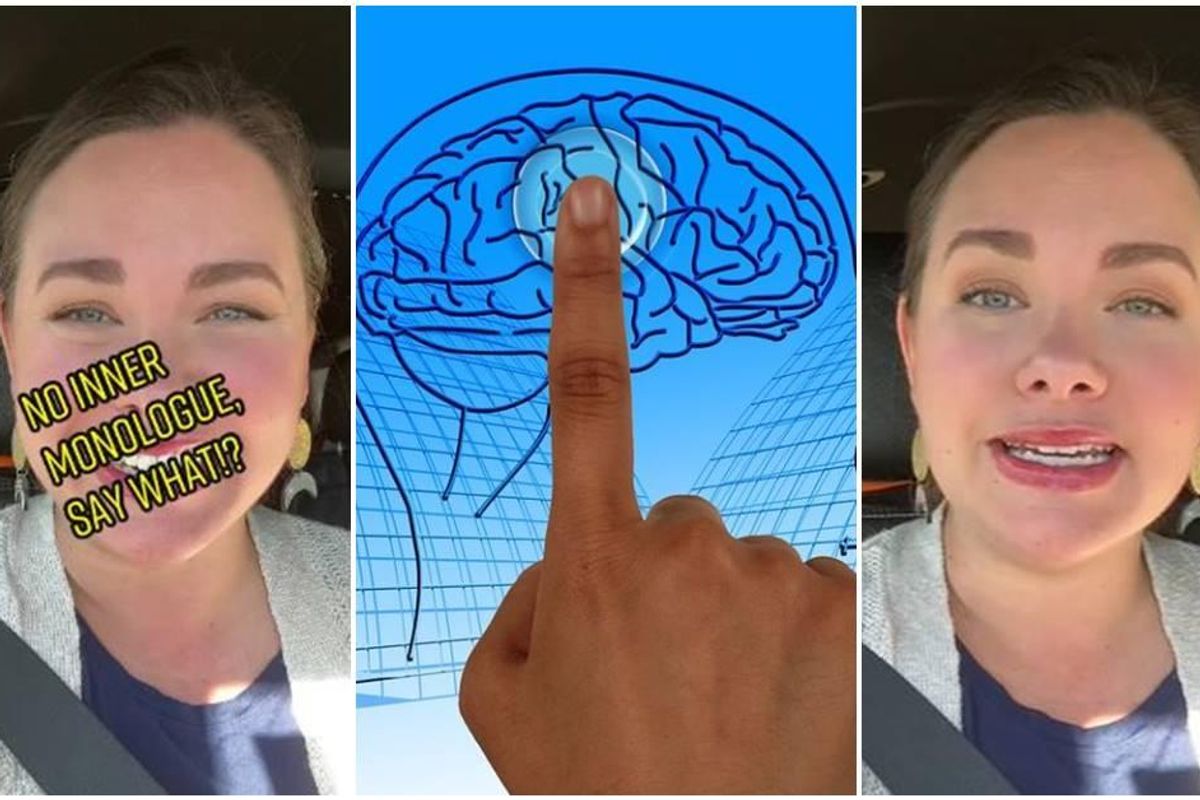Woman is shocked to learn that some people can hear their inner monologues
Not everyone can do it.

Colleen is really confused about inner monologues.
It's a little weird to think about thinking. But when you have a thought, is it a visualization, a string of words, a vague notion that carries meaning or a combination of all three? Did you know that some people can’t do all three?
A TikTok user named Colleen Carswell has a unique condition called aphantasia. According to WebMD, people with aphantasia lack a “mind’s eye," which is caused by problems in the visual cortex. It can lead to memory problems, fewer dreams and the inability to imagine hypothetical events.
In a video posted to TikTok, Carswell admitted her mind was blown when she realized her husband can hear words in his head when he thinks. "From what I'm gathering, people can hear in their mind," Colleen said, adding they can hear “inside their head,” “internally” and in their “own voice."
@colleencarswell Can you hear inside your mind!? 🤯 #aphantasia #aphant #imsoconfused #innermonologue #innerdialogue #ineedyourhelp #perspective #alwayslearningsomethingnew #thesamebutdifferent #neurodivergent #howdidinotknow #learnontiktok
"That blew my mind because, again, I have thoughts and I thought all along that's what an inner monologue was until very recently," she said. But when she learned that other people hear voices—of themselves, others or characters in a book—she didn't get it. "I am just so confused,” she admitted.
Colleen asked her husband if he could hear voices in his head and there was no doubt. "Oh yeah, I can hear. I can hear my mom's voice. I can hear your voice. I can hear the kids' voices. I can hear Kevin Hart's voice. Really any voice I want to hear, I can just hear it," he said.
This new information made Colleen wonder if she even has an internal monologue at all. So she asked her TikTok audience where they fall on the internal-voice spectrum and they left some intriguing comments.
One follower was completely floored by the revelation. "If you can't hear in your mind, how do you have your thoughts?" Perri Madison asked. "I think by talking to myself in my head literally all day." Lee Bee explained how it works, "I'm the same as her,” she wrote, “I have no images in my head and can't hear anything. But you can still think but there is no sound...does that make sense?"
Then, Karazk dropped some knowledge. "For me, the thoughts just ARE. No ‘voice’ or feeling of anything auditory."
Throughout history, people have assumed that everyone has an inner voice that uses words, but this was challenged in the late ’90s by Russell Hurlburt, a psychologist at the University of Nevada, Las Vegas. His studies found that some people think like "there's a radio in their head" while some people have no inner speech at all.
Colleen’s TikTok video encouraged a conversation where people had to seriously consider the idea that everyone thinks a little bit differently. It gave them an opportunity to try to think using someone else’s brain for a moment to consider what it’s like. These exercises are a great way to build empathy for others by helping us realize that everyone’s mind is a little bit different and that’s totally fine.

